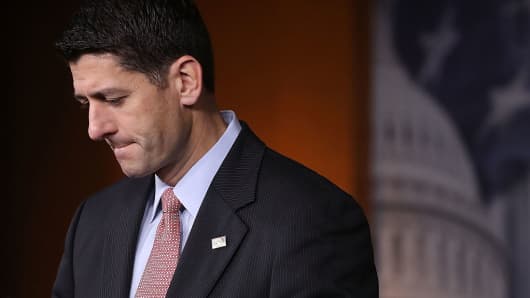There are a growing number of reports saying House Speaker Paul Ryan is considering stepping down just after the election. That makes sense, because Ryan's position looks more and more untenable given the current and likely future state of things on Capitol Hill. Most of Ryan's problem can be summarized in two words: "Donald Trump." But his and the establishment Republican Party's severe challenges are older and more serious. The Trump phenomenon isn't the cause of Ryan's woes, it's just the symptom.
Ryan is stuck in a lose/lose situation. If Trump wins, his lack of decent support for his own party's presidential candidate will make any relationship with the Trump White House difficult to say the least. A number of more pro-Trump members of his own party in the House will surely push themselves to be Speaker and run in the party caucus elections on the strong argument that they will be able to work better with the new administration. It's hard to think of any strong counter argument Ryan and his supporters could offer.
If Hillary Clinton wins the election, Ryan will still face sharp opposition from those more pro-Trump forces within the Republican Party. And if the election is as close as most polls are starting to predict it will be, those Trump supporters in and out of Washington are likelier to be even angrier at GOP leaders like Ryan whose lack of support they are likely to blame for the close loss. And if Ryan somehow survives that mess, there seems to be no way that he could grab enough support to advance any of his legislative agenda in compromise mode with the Clinton White House.
It's not a pretty picture either way. But again, Ryan and the Republican Party's problems began well before Trump and even this presidential election. In fact, the GOP as a national brand died in the eyes of the majority of the voting public on September 15, 2008. That was the day of the Lehman Brothers collapse, confirming the start of the Great Recession to go along with the public's belief that the Iraq war had been a terrible failure.



